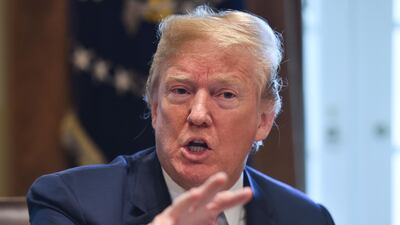The Trump administration's designation of Iran’s Revolutionary Guard Corps as a terrorist group on Monday puts it under threat of US legal and economic penalties, while raising security risks for American troops in the region.
The idea is not new. Former President George W Bush considered taking such a step in 2007 and Congress introduced a bill in 2017 to advocate it.
But for security and legal justifications, previous administrations have held off such a designation until now.
The IRGC is the now only government military force listed as a foreign terrorist organisation in a group that includes Al Qaeda, Hezbollah and ISIS.
The IRGC has massive infrastructure in Iran in security, military, economic and social sectors.
"The broad terrorist designation potentially covers 11 million members of the Iranian group and affiliated organisations," US officials told The New York Times.
US Secretary of State Mike Pompeo said the force had “enmeshed itself in the Iranian economy through both licit and illicit means”, as he warned of financial penalties for those that conducted business with the IRGC or its affiliates.
“If you’re the general counsel for a European financial institution today, there is more risk,” Mr Pompeo said.
Amir Toumaj, an independent analyst in Washington, said the move “raises risk of doing business with Iran".
"It triggers criminal prohibition on knowingly providing material support or resources to the designated organisation," Mr Toumaj told The National.
“The IRGC has stakes across the Iranian economy and companies are known for obfuscating ownership to conduct transactions."
In November 2017 the Quds Force, the external operations arm of the IRGC, was targeted by the US Treasury for running a counterfeit ring that used front companies in Germany to print counterfeit Yemeni bank notes, which could be worth hundreds of millions of dollars.
Such measures could become more common now, Mr Toumaj said.
The designation introduces a criminal component to dealing with the IRGC. US attorney general William Barr on Monday said that “any person will be prohibited from knowingly providing material support or resources, as defined under the law, or attempting or conspiring to do so, to the IRGC".
Erich Ferrari, a sanctions expert, tweeted that “while US persons couldn’t deal with the IRGC before, lest they be civilly or criminally liable, the same now goes for foreign persons".
“This ups the consequences for getting the due diligence wrong.”
"The penalties include fines and up to 20 years' imprisonment," Mr Ferrari told The National.
He said there was “an increased desire to prosecute corporate officers for US sanctions violations".
Senior Defence Department and Central Intelligence Agency officials were against Mr Trump's move, The New York Times reported.
“Top Pentagon and CIA officials oppose the designation, which they argue would allow hard-line Iranian officials to justify deadly operations against Americans overseas, especially special operations units and paramilitary units working under the CIA,” it said.
Mr Pompeo and National Security Adviser John Bolton pushed for the designation.
A Pentagon spokesman told The National that there had been no change in the rules of engagement for American troops in the Middle East since the announcement was made.
Former White House and intelligence official Ned Price expressed concern about attacks on US troops in Iraq and Syria:
A senior US official said there had been a months-long inter-agency review before the terrorist designation and it was Mr Trump’s decision to make it official.
“The President has long believed in such designation,” the official said.

